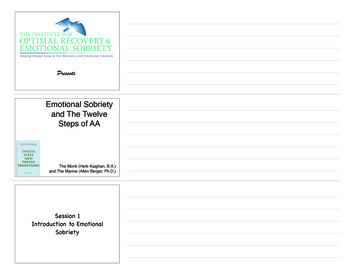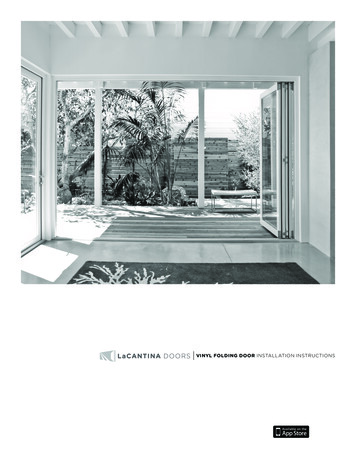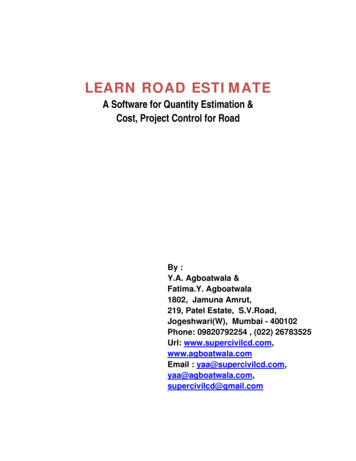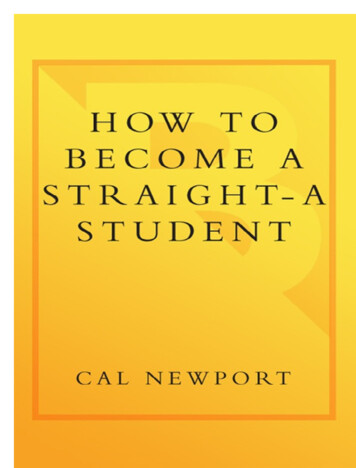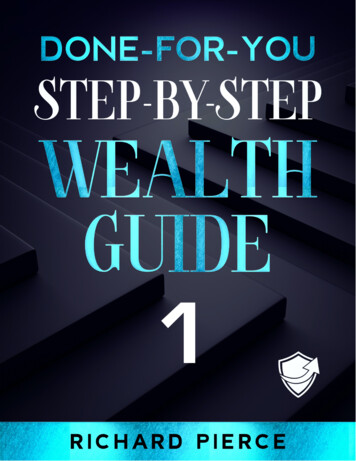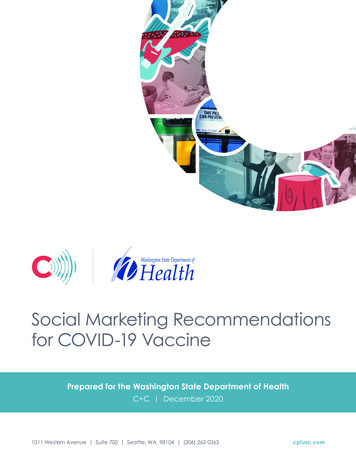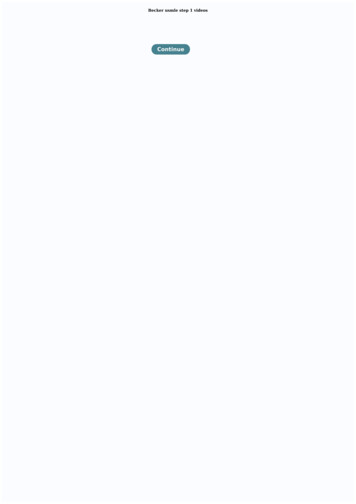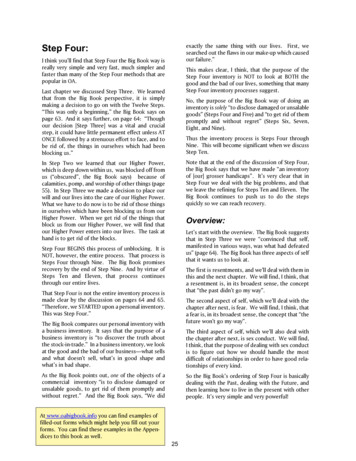
Transcription
exactly the same thing with our lives. First, wesearched out the flaws in our make-up which causedour failure.”Step Four:I think you’ll find that Step Four the Big Book way isreally very simple and very fast, much simpler andfaster than many of the Step Four methods that arepopular in OA.This makes clear, I think, that the purpose of theStep Four inventory is NOT to look at BOTH thegood and the bad of our lives, something that manyStep Four inventory processes suggest.Last chapter we discussed Step Three. We learnedthat from the Big Book perspective, it is simplymaking a decision to go on with the Twelve Steps.“This was only a beginning,” the Big Book says onpage 63. And it says further, on page 64: “Thoughour decision [Step Three] was a vital and crucialstep, it could have little permanent effect unless ATONCE followed by a strenuous effort to face, and tobe rid of, the things in ourselves which had beenblocking us.”No, the purpose of the Big Book way of doing aninventory is solely “to disclose damaged or unsalablegoods” (Steps Four and Five) and “to get rid of thempromptly and without regret” (Steps Six, Seven,Eight, and Nine).Thus the inventory process is Steps Four throughNine. This will become significant when we discussStep Ten.Note that at the end of the discussion of Step Four,the Big Book says that we have made “an inventoryof [our] grosser handicaps”. It’s very clear that inStep Four we deal with the big problems, and thatwe leave the refining for Steps Ten and Eleven. TheBig Book continues to push us to do the stepsquickly so we can reach recovery.In Step Two we learned that our Higher Power,which is deep down within us, was blocked off fromus (“obscured”, the Big Book says) because ofcalamities, pomp, and worship of other things (page55). In Step Three we made a decision to place ourwill and our lives into the care of our Higher Power.What we have to do now is to be rid of those thingsin ourselves which have been blocking us from ourHigher Power. When we get rid of the things thatblock us from our Higher Power, we will find thatour Higher Power enters into our lives. The task athand is to get rid of the blocks.Overview:Let’s start with the overview. The Big Book suggeststhat in Step Three we were “convinced that self,manifested in various ways, was what had defeatedus” (page 64). The Big Book has three aspects of selfthat it wants us to look at.Step Four BEGINS this process of unblocking. It isNOT, however, the entire process. That process isSteps Four through Nine. The Big Book promisesrecovery by the end of Step Nine. And by virtue ofSteps Ten and Eleven, that process continuesthrough our entire lives.The first is resentments, and we’ll deal with them inthis and the next chapter. We will find, I think, thata resentment is, in its broadest sense, the conceptthat “the past didn’t go my way”.That Step Four is not the entire inventory process ismade clear by the discussion on pages 64 and 65.“Therefore, we STARTED upon a personal inventory.This was Step Four.”The second aspect of self, which we’ll deal with thechapter after next, is fear. We will find, I think, thata fear is, in its broadest sense, the concept that “thefuture won’t go my way”.The Big Book compares our personal inventory witha business inventory. It says that the purpose of abusiness inventory is “to discover the truth aboutthe stock-in-trade.” In a business inventory, we lookat the good and the bad of our business—what sellsand what doesn’t sell, what’s in good shape andwhat’s in bad shape.The third aspect of self, which we’ll also deal withthe chapter after next, is sex conduct. We will find,I think, that the purpose of dealing with sex conductis to figure out how we should handle the mostdifficult of relationships in order to have good relationships of every kind.As the Big Book points out, one of the objects of acommercial inventory “is to disclose damaged orunsalable goods, to get rid of them promptly andwithout regret.” And the Big Book says, “We didSo the Big Book’s ordering of Step Four is basicallydealing with the Past, dealing with the Future, andthen learning how to live in the present with otherpeople. It’s very simple and very powerful!At www.oabigbook.info you can find examples offilled-out forms which might help you fill out yourforms. You can find these examples in the Appendices to this book as well.25
This program will never work.Step Four—Resentments:I’m fat and ugly and unlovable.So let’s start with resentments –– what the Big Bookcalls “the ‘number one’ offender.” (page 64)No one understands my pain.What is a resentment? It is something on our mindsthat we resent. Now “resentment” is broader than“anger”. It includes anger, but it goes much farther.Its Latin roots mean “to feel over and over”, and it’sbest described as anything that’s living rent-free inyour mind, things that you regret, things that angeryou or that frustrate you, things that you wish hadhappened or hadn’t happened, the what-ifs or ifonlys of our lives.Don’t put yourself down––but do put down principles about yourself that bother you. That will giveyou true insight into issues relating to you.You can consider a resentment as something orsomebody that you’re angry at because it occupiesyour mind. In a sense, then, you’re angry at peopleto whom you’ve done wrongs, because your guiltcontinues to occupy your mind. That sense ofresentment allows you to broaden the concept ofanger beyond the dictionary definition.COLUMN ONE:Filling out the resentment form:The first instruction is simply to make a list. If youuse the form available on the web site, you’ll seethat each form has room for three names of peopleor institutions or principles. Since the secondcolumn is going to have much more writing on it, ifyou know that a particular name or institution orprinciple is going to have a lot of writing in thesecond column, you could reserve a whole page forthat particular item.In one way or another, a resentment, then, is thatwhat happened in the past just didn’t go your way.It’s what we discovered in Step Three—that wewant to be in charge, and that life hasn’t gone ourway.Making this list is relatively simple. The question is“what is on your mind right now?” It’s not “whathas been on your mind in the past?” Thereforeyou’re just putting things down that you’reconscious of, not things that you think you shouldput down. You may have had some traumatic thingshappen to you but have put them to rest and don’tthink about them. If that’s true, why put themdown? We’re just putting down what’s affecting usnow.The first instruction the Big Book gives is to list“people, institutions or principles with whom wewere angry” (Page 64). It is true that the Big Bookuses the word “angry”. I can only suggest thatlisting people, institutions, or principles that youresent (or that you are “angry” at because theyoccupy your mind) is very very helpful.People are people. You make a list of people who areliving rent-free in your mind.I’ve put down very serious items, like my wife andmy parents and my children, like Hitler and certainpoliticians and murderers, like ex-girlfriends and theman I trusted who lied to me, and very minor things,like people who don’t spell words correctly or thatperson who cut me off at the intersection.Institutions are institutions—groups of people.Principles, however, are not defined in the Big Bookand are not easy to define. I find that it’s veryhelpful to consider “principles” as meaning “ideasthat seem to be true that bother me”. Here aresome examples:I also put down people I’ve harmed, because Icontinue to think about that harm and feel guiltyabout it, and that’s a resentment as well.I’ll never get thin.I have found that if I write my list in an evening I willremember some more things in the morning.There will always be terrible suffering inthis world.I can never eat french fries again.COLUMN TWO:Life sucks, and then you die.The second instruction is to ask “why we wereangry” (page 64), or what “our injuries” were (page65). An example is given at the bottom of page 65for what we write in this column. We are to writePeople ignore me.I’ll never amount to anything.26
27
28
short and to-the-point description of the variousthings that put these people or these institutions orthese principles in our minds. We need to writeonly enough so that we know what we are talkingabout. We’re not filling out this second column foranyone but ourselves.personal, or sex relations, which had been interfered with?” (page 65). (You’ll note at the bottomof page 64, a similar set of categories, but with“pocketbooks”—wallets or purses—instead of“security”.) The resentment form has separate subcolumns for each one of these concepts. As well,because the example at the bottom of page 65 has“fear” in that third column as well, the form has aseparate sub-column for fear.Let me give some examples.Beside Hitler, for example, I can put:Self-esteem means how I feel about myself. Securitymeans how safe I feel, including financially safe.Ambitions means what I want out of life. Personalrelations, sex relations, and fear, are obvious.responsible for the deaths of millions ofpeoplefurthered the cause of anti-Semitismis still a hero to some peopleSo for each one of the “causes” (column two) we putcheck-marks where each one of these sub-categories has been affected.created conditions that created problemsfor my growing upUsing the Hitler example above, for instance:Beside an ex-girlfriend, for example (and this isONLY an example!), I could put:responsible for the deaths of millions of people.Doesn’t affect my self-esteem and sex relations, does affect my security, my ambitions, and my personal relationships, and isassociated with fear.didn’t love me enoughused meI used herfurthered the cause of anti-Semitism. Doesaffect my self-esteem, security, ambitions,personal relationships, and is associatedwith fear; doesn’t affect my sex relations.that one day when . . .I still think of herif only . . .is still a hero to some people. Doesn’t affectmy self-esteem, my personal relations, mysex relations; does affect my security, myambitions, and my fear.Beside the institution of government, for example, Icould put:doesn’t accomplish anythingcreated conditions that created problems formy growing up. . . . etc.I don’t get involved enoughpeople are still sufferingUsing the “I’ll never be thin” example above, forinstance:Beside the principle of “I’ll never get thin”, forexample, I could put:I’ll never be attractive to the opposite sex.Affects my self-esteem, ambitions, personaland sex relations and fear; doesn’t affectmy security.I’ll never be attractive to the opposite sexI’ll die earlyI’ll waste those pants I’ve been saving forten years!I’ll die early. Doesn’t affect my self-esteem,personal or sex relations; affects my ambitions and fear and security.I don’t want to give up food badly enoughYou can see the kind of things we fill out in thesecond column. The object is to have as manypoints as possible, but there’s no need to go intoany details on each point.I’ll waste those pants I’ve been saving for tenyears! Affects my security (pocketbooks),but doesn’t affect anything else.I don’t want to give up food badly enough. . . .etc.COLUMN THREE:The third instruction is to ask ourselves “Was it ourself-esteem, our security, our ambitions, our30
So you can see that filling out these sub-columnsinvolves some thinking about each particular pointin column two and how it is affecting me.live, we had to be free of anger. Thegrouch and the brainstorm were not forus. They may be the dubious luxury ofnormal men, but for alcoholics thesethings are poison. (page 65)The Big Book says about this process: “We wentback through our lives. Nothing counted but thoroughness and honesty” (page 65).How true those words are! Any life—alcoholic orcompulsive eater or not—which includes deepresentment tends to futility and unhappiness,because we waste time that we could have used forsomething else. But for us compulsive eaters, deepresentment is absolutely fatal, because “we shutourselves off” from our higher power, and we goback to eating.We have to be free ofanger/resentment, that “dubious luxury of normalmen”.I don’t know how long it will take each one of youto do this, but it shouldn’t take a very long time.Even if you end up with 200 names of people andinstitutions and principles, and even if you putdown four or five points about most of them, andten or twenty points about some of them, that’s notgoing to take more than a total of ten or fifteenhours. Granted, you may want to take some time todo this, to think about things, but the object is towrite down what’s on your mind, not what’s lurkingin your sub-conscious mind. Column one is naming;column two is venting; and column three begins ananalysis.As you fill the form out, I think you will begin to seehow brilliant and how deep it is. (I showed it to apsychiatrist once who was overwhelmed by it.) First column, we just list on paper thingsthat are bugging us. Second column, we write out why they’rebugging us.EXAMINING CAREFULLY WHAT WE’VE DONE:Now here’s what the Big Book says after we finishthese three columns. “The first thing apparent wasthat this world and its people were often quitewrong” (pages 64 to 65). Third column, we begin to see how thethings that are bugging us are actuallykilling us. People who did us wrongcontinue to harm us. People we did harmto harm us. Ideas that we have are killingus. No wonder we’re blocked off from ourhigher power!It is truly an amazing feeling after filling out thesethree columns to see how many check-marks wehave put down. We begin to see that the mostimportant things about ourselves—how we feelabout ourselves (self-esteem), how safe we feel(security), how frustrated we feel (ambitions), howwe relate to others (personal relations), how werelate sexually to others (sex relations), and howfearful we are—are being controlled by otherpeople and institutions and abstract concepts. Nowonder we’re not happy. And no wonder we eat.The Big Book says:You can see how this form gives us hope. We’removing from the things that BOTHER us to to thethings that are BLOCKING us from our higher power!There’s hope just around the corner! As the BigBook says at page 65, this list holds “the key to thefuture”!Questions:It is plain that a life which includes deepresentment leads only to futility andunhappiness. To the precise extent thatwe permit these, do we squander thehours that might have been worth while.But with the alcoholic, whose hope isthe maintenance and growth of a spiritual experience, this business of resentment is infinitely grave. We found that itis fatal. For when harboring such feelings we shut ourselves off from thesunlight of the Spirit. The insanity ofalcohol returns and we drink again. Andwith us, to drink is to die. If we were toHere are some questions. The whole of Step Four isanswering questions, of course.What’s on your mind that’s bugging you?Are the reasons that these things are bothering you affecting much of your life? Dothey affect how you feel about yourself,how safe you feel, how frustrated you feel,how good or bad your relations (personalor sexual) are, and how full of fear you are?Can you see that these things are blockingyou from the sunlight of the spirit?31
Resentments Continued:come our resentments against them, we will not beable to see our part, our flaws.Last chapter I discussed the first three columns ofthe resentment form. These are the columns actually depicted on page 65 of the Big Book. Manypeople (including me for the first six years in theprogram) assumed that those three columns are theonly columns in the resentment form.Here the Big Book gives very cryptic but clearinstructions:This was our course: We realized thatthe people who wronged us wereperhaps spiritually sick. Though we didnot like their symptoms and the waythese disturbed us, they, like ourselves,were sick too. We asked God to help usshow them the same tolerance, pity,and patience that we would cheerfullygrant a sick friend. (pages 65-66)In fact, there is a fourth column, and it turns out thatthis fourth column is the most important one of all!The first three columns are actually simply PREPARATIONS for the fourth column.The essential Fourth Column:What does it mean to say that the people whowronged us were, “like ourselves”, also sick? Whatis a spiritual sickness?Let’s remember that the purpose of Step Four is toidentify those parts of ourselves which are blockingus from our higher power. We have decided, in StepThree, to turn our will and our lives over to the careof God as we understand God. That decision meansthat we have to discover what defects of characterblock us from our higher power. The fourth columnof the resentment form is in fact our analysis ofthose defects of character.How do we treat people as spiritually sick?We excuse people all the time. We understand itand often instantly forgive people who have neurological disorders (like Tourette’s Syndrome) or braintumours, or who are in constant pain, if they snap atus or insult us. We realize that it isn’t really theirfault. Things are going on inside them that maketheir reactions to life beyond their control. If I werein constant pain, I think I’d be pretty grouchy mostof the time.Dealing with things that botherus:But before we can look at our defects of character,we have to deal with all the things that botherus—those aspects of the past that haven’t gone ourway.Can we not look at people who have wronged us asbeing in spiritual pain? Let’s look at the history ofthe people who have wronged us. Can we not seesomewhere in their upbringing, or in their life experiences, or in how they relate to other people, thatthey are sick?The check-marks in the third column are very effective graphic representations of our paralysis. Andthey help us to convince ourselves that the things inour past which bother us—our resentments—havethe power to kill us, because so long as we felt ourresentments, the third column showed us that wefelt badly about ourselves (self-esteem), we feltunsafe (security), we felt thwarted and frustrated(ambitions), our personal and sex relations weredeeply affected, and we were full of fear. How couldwe live life positively if these very deep emotionswere being controlled by how we feel about thepast?How many people who have committed sexual orphysical violence were themselves recipients ofabuse? How many “bad” parents were themselvesthe product of “bad” parenting? Don’t many peopledo bad things for reasons which they think arevalid? Isn’t there a sickness to be seen in thosepeople?And what right do I have to be righteous? Haven’tI done bad things for reasons which I thought werevalid? Maybe not as bad as these people, but inreality, they’re not so much worse than I am.The Big Book tells us that we should go back to ourlist, “for it [holds] the key to the future” (page 65).If we can master our resentments, then we can lookat our own flaws.Page 552 (third and fourth edition) of the Big Bookcontains a suggestion for dealing with resentmentswe find overwhelmingly difficult to overcome. Thesuggestion is that we pray for those we resent that“everything you want for yourself be given toOur biggest problem is, of course, with people whohave wronged us, people who have done thingswhich we wish they hadn’t done. If we can’t over-32
them—their health, their prosperity, their happiness”; that we do this whether we want to or not.By definition that’s a spiritual sickness! If I’m willingto understand myself, then I have to be willing tounderstand others.The amazing thing about this suggestion is that itrequires us first of all to figure out what we want forourselves. When I did this, I realized that what Ireally wanted for my self was serenity, a sense ofusefulness, an ability to love and to be loved.So these few sentences from the bottom of page 66to the top of page 67 really helped change myattitudes to people who had been controlling mylife because of the things they had done to me or tomy loved ones or to humanity in general. I was ableto look at them as extremely damaged people, andto feel pity and sadness for them. In effect, they hadbecome “beneath contempt”.And when I prayed for the people I hated, something hit me in the face—that wonderful blindingflash of the obvious!—and that was that none of thepeople I hated were serene, were useful, or wereable to love and to be loved. They led lives basedon fear or mistrust of other people. They were cruelor dishonest or hurt others (including me). Howcould they ever have serenity? How could they everbe useful? How could they ever love or be loved?Even if they thought they were happy, they wereliving superficial and sad lives.Moreover I began to see something that willbecome extremely important for the fourth columnof this resentment form. If I accept that the moreharm they did to me or others, the more harm theydid to themselves, then I am forced to accept thatallowing them to continue to do harm allowed themto do harm to themselves. Thus I began to get aninsight into the character defect of dishonesty,which I’ll talk about in a few paragraphs.Thus the more harm they did in this world, the morethey cut themselves off from the sunlight of thespirit, the less human they became, the more harmthey did to themselves.So we look at these people (column one), “theirsymptoms” (column two), “and the way thesedisturbed us” (column three). We find that thesepeople were sick too. And we’re given a prayer tosay. “We asked God to help us show them the sametolerance, pity, and patience that we would cheerfully grant a sick friend.” There’s the prayer: “God,please help me show the same tolerance,pity, and patience, that I would cheerfully grant asick friend.”That is spiritual sickness. That is pitiful. I began notto hate them but to pity them. Certainly I hatedwhat they had done, not simply to me but to others.But I saw that every wrong move they made, everyhurt they created, was a nail in their own coffin aswell. They did harm to themselves by doing harmto others.I was thus able to deal with such difficult people onmy list as Hitler and others who have been responsible for horrible deeds in this world. By the timethey committed all those deeds, they had renderedthemselves so sub-human that it seemed impossiblefor them ever to regain their humanity. The thingsthey did were horrible; and the “things” theybecame were horrible too. You can’t blame a dogor a cat for doing damage in your house. And thesepeople were more like animals (not that I’m sayingthat dogs or cats could do what these people did!)than like humans.Our four defects of character:Now that we have said that prayer about eachperson on our list who has harmed us or others,On page 67, after providing the instructions forStep Four, the Big Book goes on to suggest waysin which we deal with people who bother us inthe future:“When a person offended [the original manuscript actually said “next offended”] we said toourselves, ‘This is a sick man. How can I behelpful to him? God save me from being angry.Thy will be done.’”As well, I was and am willing to admit that I am notperfect! I clearly have a spiritual sickness—the BigBook has convinced me of that. That spiritual sickness consists at the very least of my wish to be incharge of life, and my everlasting frustration that lifehasn’t gone my way and is likely never to go my way.As well, the Big Book suggests ways of dealingwith these people in the future—avoiding retaliation or argument. Neither this prayer nor thesesuggestions are part of the Step Four instructions. They are guides to living.The author of the story “Freedom from Bondage”,where the page 552 resentment prayer is found,gives credit in a talk she gave in 1973 in Oxnard,California, to an article in Liberty providing a condensation of Norman Vincent Peale’s book, AGuide to Confident Living.33
SELFISH:we’re ready to look at our own mistakes. Here arethe Big Book’s instructions (page 67):Selfish has already been defined very broadly by theBig Book in its discussion of Step Three. Selfishmeans not only what the dictionary says it means—wanting things my way for my own purposes orcomfort—but it also means something broader thanthat. It means wanting things my way period,regardless of my motives. (See the discussion ofStep Three for more details.)Referring to our list again. Putting out ofour minds the wrongs others had done,we resolutely looked for our ownmistakes. Where had we been selfish,dishonest, self-seeking and frightened?Though a situation had not been entirelyour fault, we tried to disregard the otherperson involved entirely. Where werewe to blame?DISHONEST:So the instructions on the form are pretty literal. Toput out of our minds the wrongs others had done,we fold the paper over to cover columns two andthree, leaving us with columns one and four.Dishonest certainly means telling untruths, lying,defrauding, deceiving. And the recipient of thedishonesty isn’t always another person. It can beme! I can be fooling myself about reality.Covering up columns two and three:Beyond that, for a people-pleaser like me, anotheraspect of dishonesty is “not telling the truth whenthe truth should be told”. If I continued in a relationship, for instance, in which harm was beingdone to me (and I’ve been in some destructiverelationships, although nothing even close to thekind of abuse I’ve heard described in the rooms ofOA), or if I’ve seen injustices being done and saidnothing (and that’s happened much more often), amI not being dishonest by not speaking the truth, bynot saying, “Wait a minute, this is wrong!”?Why do we cover up columns two and three?It’s not simply because the Big Book tells us to putout of our minds the wrongs others have done us,and that’s what’s in columns two and three—at leastfor those people who have done us wrong.It’s because we must now focus on where we wereat fault. That requires a look at the entire relationship between those people, principles, and institutions listed in column one and ourselves. Whatcolumns two and three represent is not the entirerelationship, but simply the particular issues thatcame to mind when we started upon our inventory.There may be understandable reasons for doingthis, but isn’t that a character flaw; and isn’t thatultimately dishonesty too?So there are three kinds of dishonesty: tellinguntruths to others, telling untruths to myself, andnot telling the truth when the truth should be told.Now that we’ve been able to accept those who havewronged us as spiritually sick, now that we’refocusing on our own contributions to the problems,we are entering a new way of looking at things.That requires us to cover up columns two and three.SELF-SEEKING:Self-seeking is more difficult to define. The Big Bookrarely uses it. A dictionary will use the word“selfish” to describe “self-seeking”, which isn’t reallyhelpful to us. My best understanding of the wordcomes from breaking it down: “Seeking my self” inothers. It’s like self-esteem. How does this person,institution, or principle in column one define how Ifeel about myself?We don’t forget about the matters that might haveappeared in columns two and three. Very often—but not always—those matters will surface incolumn four. Sometimes, however, those matterswill have disappeared and completely new andstriking insights will surface.So we cover up columns two and three and thenlook at the people, institutions, and principles, onour lists (column one) and ask ourselves four simplequestions: Where have I been selfish? Where haveI been dishonest? Where have I been self-seeking?Where have I been frightened?We can also understand it by asking whether withthis person or principle or institution it was allabout us or whether it was about the other. In thatcontext, self-seeking is putting our sense of selvesforward. It’s also not being considerate of others,because we’re thinking of ourselves.Definitions:I’ve found those concepts to be very helpful questions to ask, so that’s how I interpret the word“self-seeking”.What do these words mean? This is the best I’vecome up with.34
FRIGHTENED:Self-seeking: And self-seeking? Wow. I have let somany people and situations define how I feel aboutmyself. I have sought after a definition of myself inothers. If you like me, then maybe I’m likable. If youdon’t like me, then you’re probably really smart,because you can see below the surface. One badevaluation out of a hundred is the one that I focus on.Frightened asks us how and why we felt any fear inrelation to the people, institutions, or principles incolumn one.Those are the four character defects the Big Bookdiscloses with respect to resentments. We’ll see thatno more are added by the fear and sex conduct partsof Step Four. We can see now that these four character defects completely define our problem.Fear: And full of fear! Afraid that people will find outwhat I’ve done. Afraid that people won’t respect orlike or admire me. Afraid that I won’t get what Iwant. Afraid I’ll lose what I have. Afraid ofconfronting someone. Afraid for my life.Applying the definitions:Selfish: I’m selfish. At the very least, I wish thepeople, institutions, or principles that I set out incolumn one just didn’t exist or hadn’t happened orhadn’t done to me what they did or I didn’t do whatI did to them. I just wish the past was different. Iwish people hadn’t died or got sick. I wish peopledidn’t suffer as they’re suffer. I wish the world werea better place. That’s selfish, the Big Book way—Iwant my way rather than what is. But I will also findthat there is much of me that is selfish the dictionaryway. I wish that the people, institutions, or principles in column one hadn’t happened because of thepain or the humiliation or the lack of security or thebad relationships or the bitterness or the guilt or the. . . .—in other words, I wish that
Big Book continues to push us to do the steps quickly so we can reach recovery. Overview: Let's start with the overview. The Big Book suggests that in Step Three we were "convinced that self, manifested in various ways, was what had defeated us" (page 64). The Big Book has three aspects of self that it wants us to look at.



